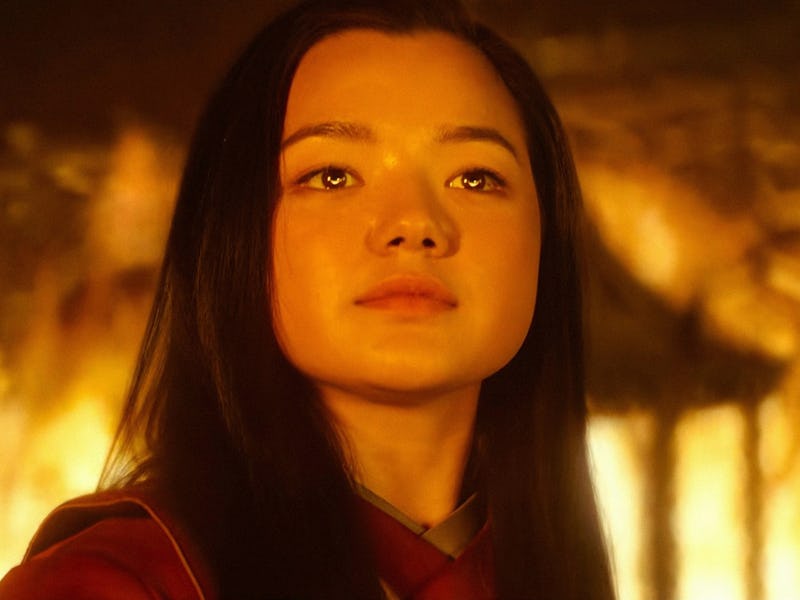Azula is the Best Villain in Avatar. Why is Netflix Changing Her?
The live-action remake tries to flesh out the full story, but it hurts its most nuanced characters in the process.

We’re living through an era of sympathetic villains. There’s nothing wrong with that, as the success of films like Black Panther and the popularity of characters like Anakin Skywalker have proven time and again. Netflix’s biggest shows have also had a lot of success in that arena, but attempts to translate that success to the live-action Avatar: The Last Airbender remake are already starting to backfire.
The original Avatar benefitted from a revolving door of antagonists: some sympathetic, others utterly uncompromising. A diverse spectrum of characters made the series one of the most sophisticated examples of children’s programming, and a lot of that translates pretty seamlessly to the Netflix remake. Showrunner Albert Kim even makes previously-amiable characters — like the Earth Kingdom ruler Bumi — into full-out antagonists, which only makes the story feel more complex.
Meanwhile, the original series’ most ruthless characters are somewhat softened. This is especially the case for an overarching antagonist, the Fire Nation Prince Zuko (Dallas Liu). With 20 years removed from the original series, it’s no secret that Zuko is eventually redeemed. His is one of Avatar’s most mature and fulfilling arcs, and it’s only enriched by its parallels with Princess Azula (Elizabeth Yu), Zuko’s sister. Both characters get a more sympathetic treatment in Netflix’s Avatar — and while it works fine for Zuko, the same cannot be said for Azula.
Avatar works hard to redefine the original show’s most complicated characters, to varied effect.
Kim detailed some changes made to the source material in the lead up to Avatar’s premiere. When it came to Azula specifically, Kim credits the “benefit of hindsight” in having all three seasons of the cartoon to pull from. In the original Avatar, Azula doesn’t appear until the second season. But Kim and his creative team saw an opportunity to bring a bit more depth to the character by bringing her into Season 1. “We know how big a character Azula becomes in the series,” Kim told SFX Magazine, “so we had the benefit of hindsight in fleshing out her character and being able to tell a story with her in it in Season 1.”
Unfortunately, that doesn’t really work. Fleshing Azula out is one thing — but in introducing her prematurely, Avatar is also sowing the seeds to make her a more sympathetic character. That’s not entirely bad for someone like Zuko, who’s meant to be redeemed. Unlike her brother, though, Azula never gets a redemption arc — at least not in Avatar’s three planned seasons. She’s well-established as a sadistic, sociopathic manipulator, one whose perfectionism eventually leads to her downfall. Her total lack of morality is crucial to establishing the savagery of her father, Fire Lord Ozai (Daniel Dae Kim), and his need to mold his children into instruments of battle.
Azula’s attempts to prove herself to Fire Lord Ozai feel unnecessary, especially for fans of the original Avatar.
Avatar Season 1 pulls the curtain back to explore aspects of Azula’s life in the Fire Nation capital. We see her struggle under Ozai’s impossible expectations, which works... until it doesn’t. On one hand, it brings light to an issue that occasionally felt too subtle in the original series. On the other, it makes Azula’s arc dangerously similar to Zuko’s. Given that her lack of empathy was always meant to serve as a foil to Zuko’s redemption, it’s not a good sign that the lines between the characters are already growing blurred.
Things get messier with the introduction of Mai (Thalia Tran) and Ty Lee (Momona Tamada). The original Avatar positions the characters as the closest thing Azula has to friends — but their relationship is built on a precarious set of expectations. Their dynamic is perfectly established in episodes like “Return to Omashu.” In her hunt for her disavowed brother and uncle Iroh, Azula tries to recruit Ty Lee, an old classmate, into her ranks. She’s only able to win Ty Lee to her side after corrupting the one thing that represents freedom to the character, and she uses similar methods to keep Ty Lee and Mai in line throughout the animated series.
Characters like Mai and Ty Lee are brought into Season 1 along with Azula, but Avatar doesn’t seem to know what to do with them.
Azula employs the same abuse tactics on Mai and Ty Lee as those that Ozai clearly used on her. That’s largely done away with in Netflix’s Avatar, which uses Mai and Ty Lee to spell out Azula’s own abuse in the plainest terms possible. It’s an egregious flattening of a complex, often volatile, dynamic. There’s a chance that subsequent seasons will get the chance to explore their original relationship in other ways, but Avatar Season 1 doesn’t lay down a very firm foundation for these characters.
Kim claims that a full scope of the story helped flesh Azula out in new ways — but in trying to tease future developments, Avatar has actually hurt some of its most nuanced and compelling characters. There’s nothing wrong with garnering sympathy for Azula: despite her rich characterization, she’s probably one of Avatar’s most misunderstood characters. She’s also one of the series’ most objectively evil. Those traits coexist inside her; one shouldn’t be diminished at expense of the other. Again, it’s not too late to remedy her characterization, but it’s disappointing to see the original series’ most sophisticated choices undermined so early in the game.